人教版高中英语必修4 Unit 1 Women of achievement Reading task (共47张PPT)
文档属性
| 名称 | 人教版高中英语必修4 Unit 1 Women of achievement Reading task (共47张PPT) | 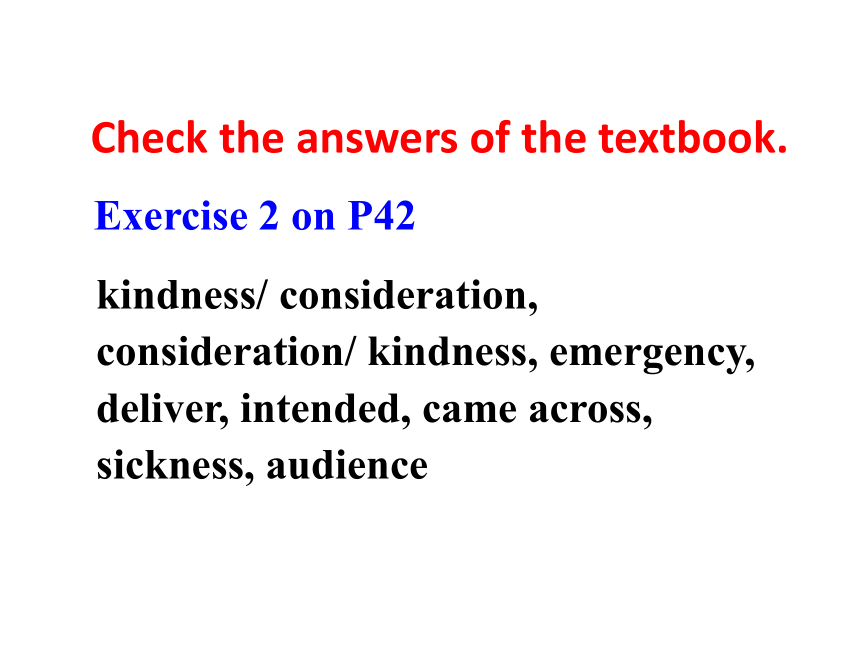 | |
| 格式 | zip | ||
| 文件大小 | 436.5KB | ||
| 资源类型 | 教案 | ||
| 版本资源 | 人教版(新课程标准) | ||
| 科目 | 英语 | ||
| 更新时间 | 2020-05-07 19:18:00 | ||
图片预览

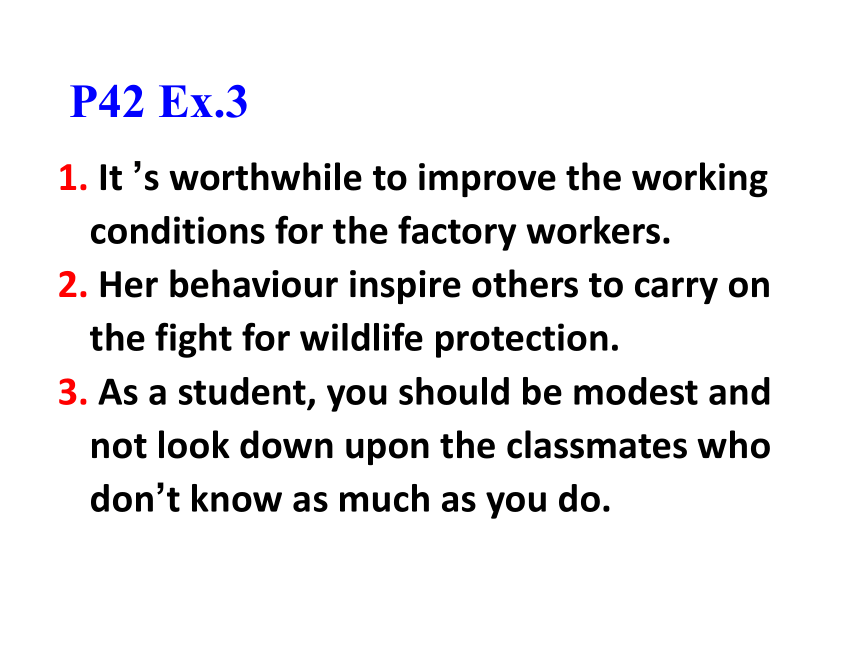
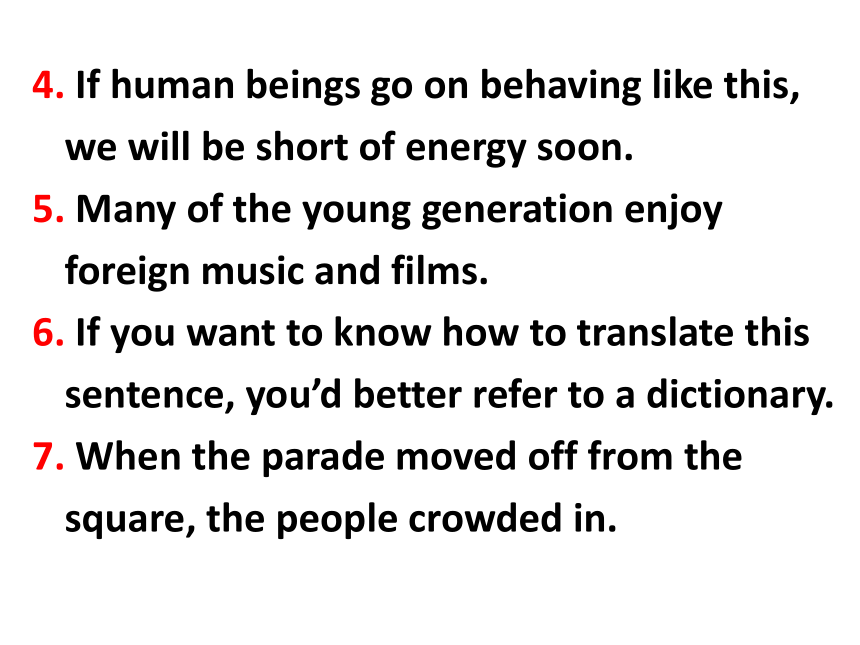
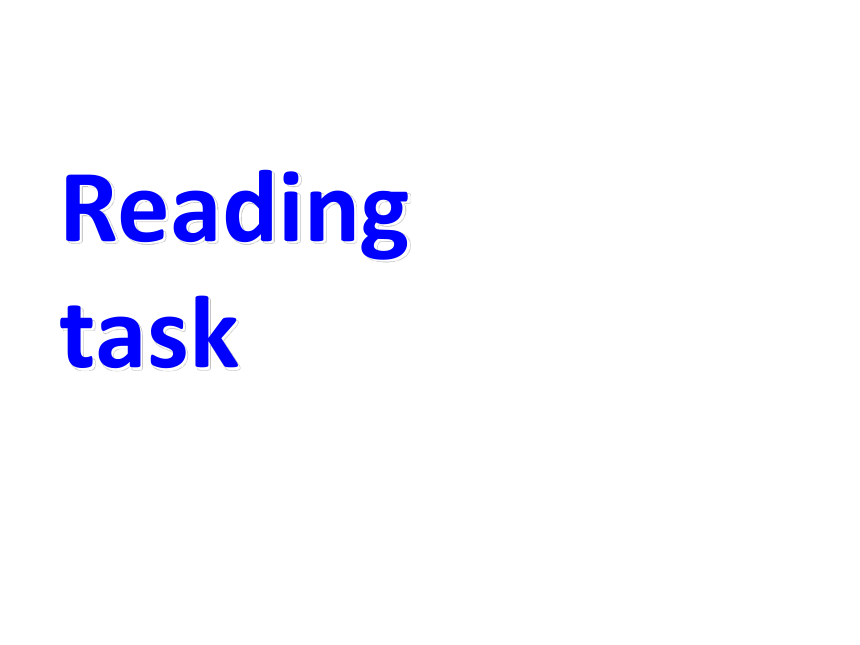
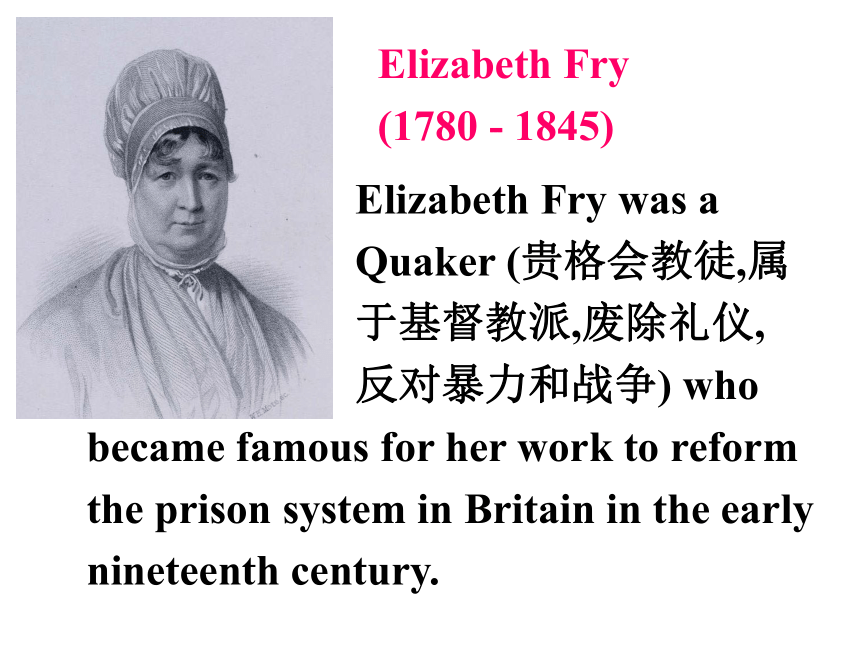
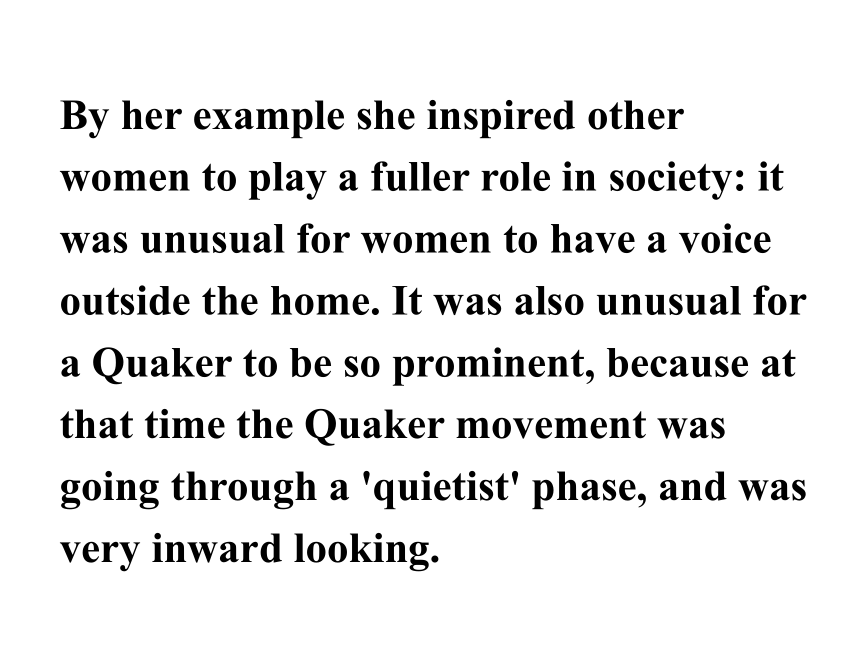
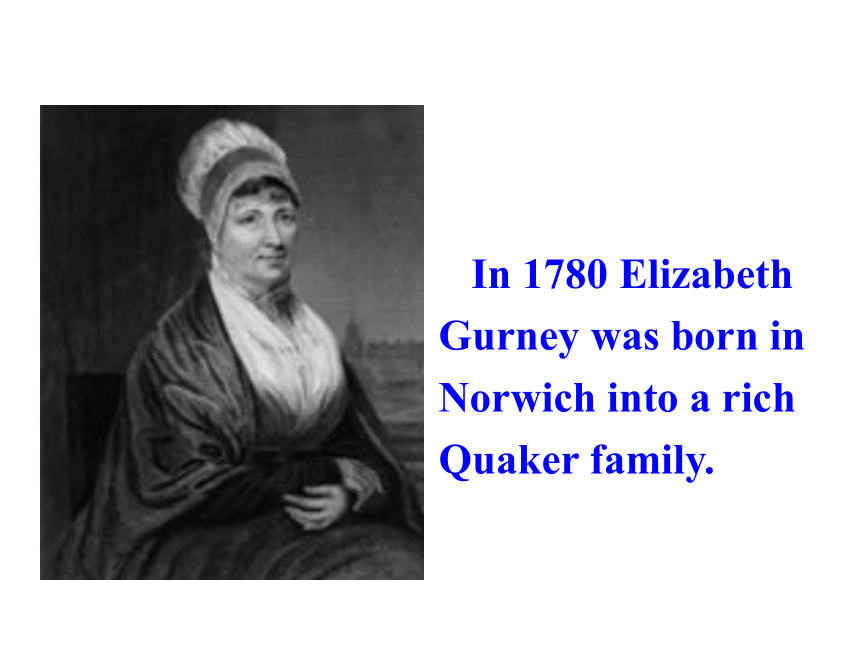
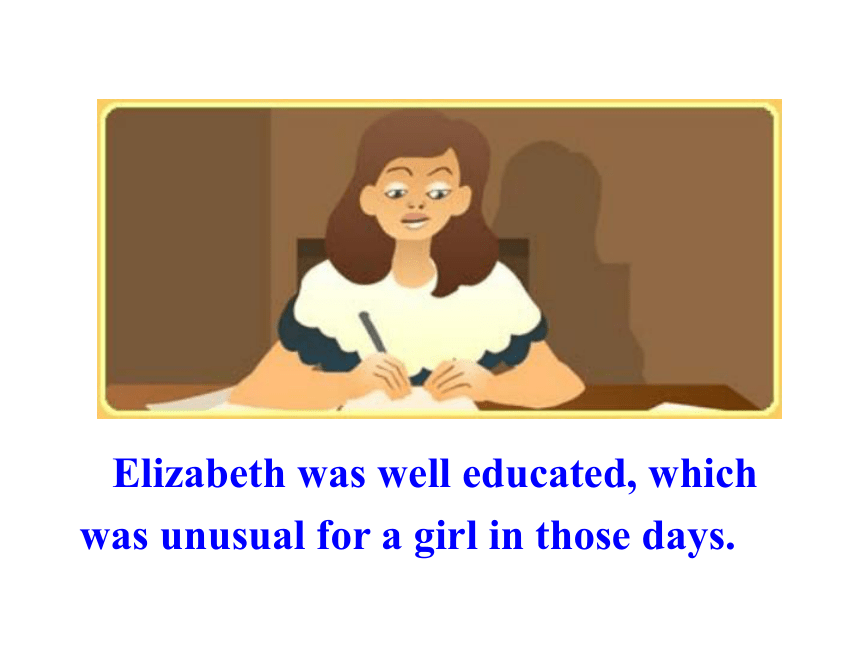
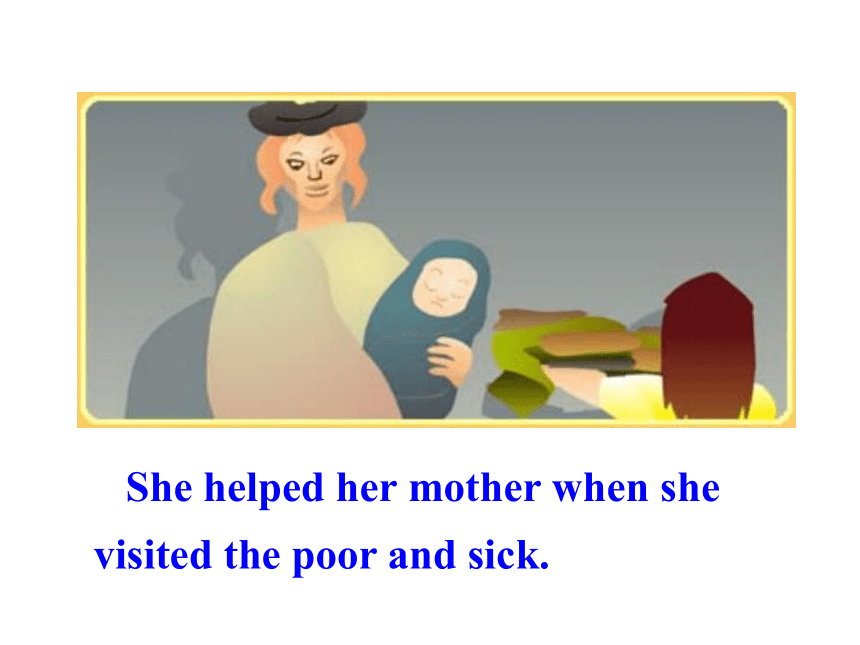
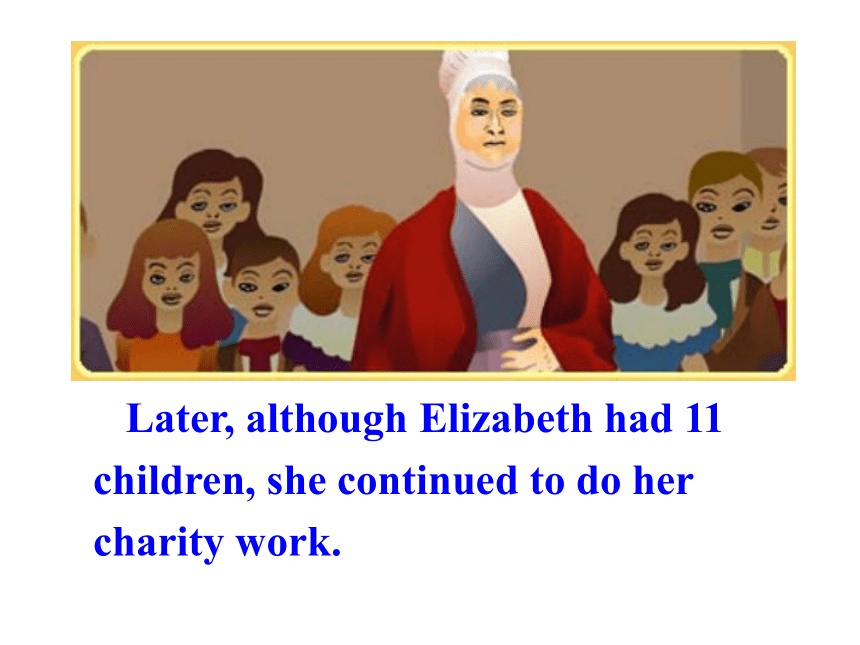
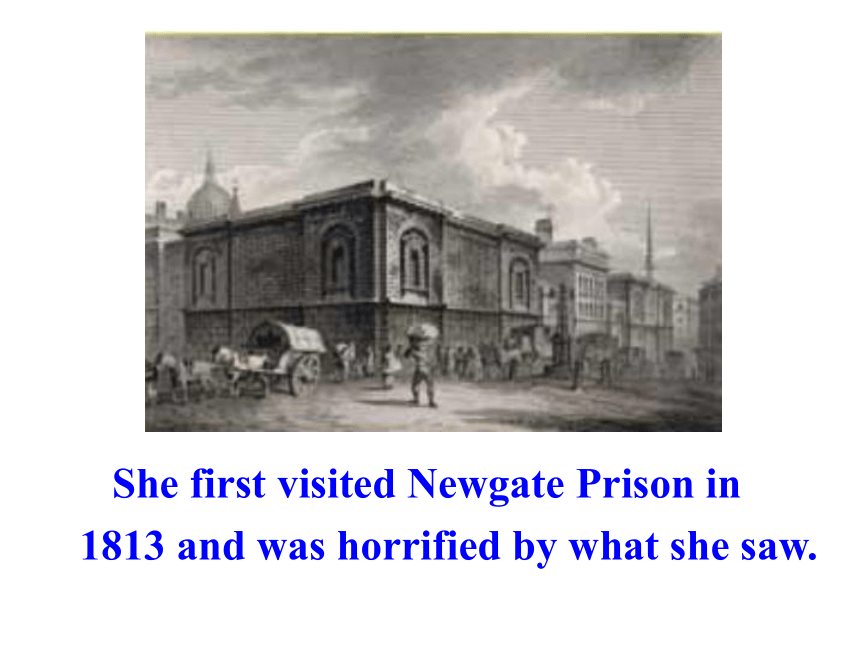
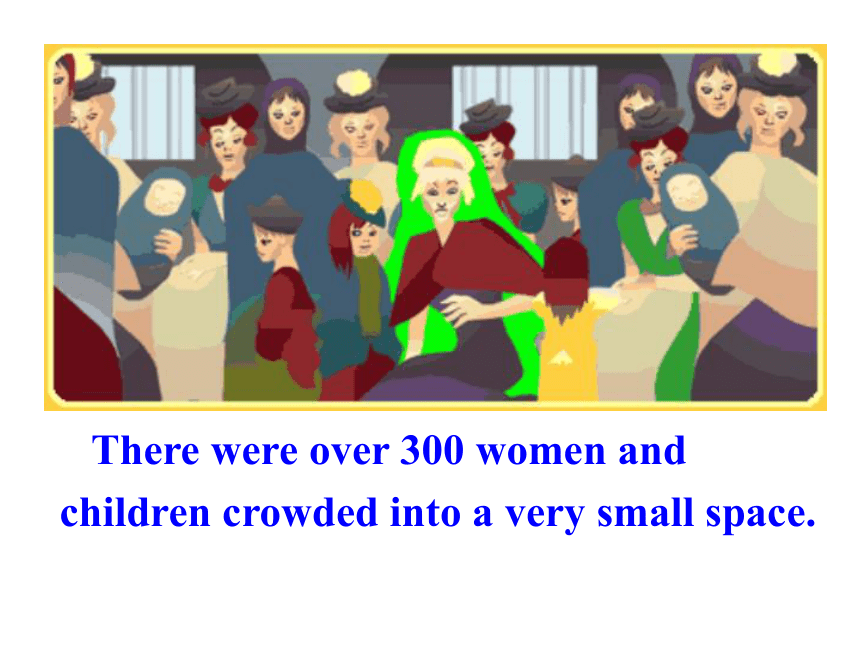
文档简介
(共47张PPT)
Check the answers of the textbook.
Exercise 2 on P42
kindness/ consideration, consideration/ kindness, emergency, deliver, intended, came across, sickness, audience
1. It ’s worthwhile to improve the working conditions for the factory workers.
2. Her behaviour inspire others to carry on the fight for wildlife protection.
3. As a student, you should be modest and not look down upon the classmates who don’t know as much as you do.
P42 Ex.3
4. If human beings go on behaving like this, we will be short of energy soon.
5. Many of the young generation enjoy foreign music and films.
6. If you want to know how to translate this sentence, you’d better refer to a dictionary.
7. When the parade moved off from the square, the people crowded in.
Reading task
Elizabeth Fry?
(1780 - 1845)
Elizabeth Fry was a
Quaker (贵格会教徒,属
于基督教派,废除礼仪,
反对暴力和战争) who became famous for her work to reform the prison system in Britain in the early nineteenth century.
By her example she inspired other women to play a fuller role in society: it was unusual for women to have a voice outside the home. It was also unusual for a Quaker to be so prominent, because at that time the Quaker movement was going through a 'quietist' phase, and was very inward looking.
In 1780 Elizabeth Gurney was born in Norwich into a rich Quaker family.
Elizabeth was well educated, which was unusual for a girl in those days.
She helped her mother when she visited the poor and sick.
Later, although Elizabeth had 11 children, she continued to do her charity work.
She first visited Newgate Prison in 1813 and was horrified by what she saw.
There were over 300 women and children crowded into a very small space.
Elizabeth returned with warm clothing and straw for the sick women and children.
Prisoners had to pay for everything in gaol (监狱).
There were no toilets, just a bucket in the corner, and little drinking water.
Children were sent to prison for stealing bread, wool or for damaging trees.
Punishments for rich people were very different from those for poor people.
In 1817 Elizabeth organised a group to help female prisoners at Newgate prison.
She provided items for the women so they could sew, knit and make goods to sell.
She started a prison school for the children to give them something to do.
In 1818 Elizabeth was asked to speak to people in Parliament about the prisons.
The 1823 Gaol Act was passed by Parliament, and some improvements were made.
Elizabeth visited prisons all over Britain and argued for improvements.
She wrote a book about prison conditions.
She helped improve conditions on prison ships travelling to Australia.
Prisoners were no longer chained to the decks during the voyage.
Elizabeth Fry also set up a training course for nurses.
Elizabeth Fry continued to help others until she died on 12 October 1845.
Elizabeth Fry
Born 1780.
Died 1845.
Read the article quickly and find the answers to these questions:
1. How did the women prisoners live?
They were being treated like animals. They had no beds, clean clothes, food or heating. Any child born in prison had to stay there and had no chance of receiving an education.
2. What did Elizabeth Fry do to help them?
She provided food, clean clothes and straw for beds. Later she began a prison school for the children and taught the women to sew, knit and make goods to sell. And later she was
asked to go to the leaders of Britain to discuss how to improve the conditions for prisoners.
3. What’s the result of her effort?
There are three results. One is that the women prisoners got some self-respect and improved their conditions for themselves. The second is that her
deeds influent some other women to join in the activity to help the women prisoners. The last one and also the most important one is that in 1947, after she died long time, the Quakers were given the Nobel Peace Prize.
Notes on English prisons in the nineteenth century Elizabeth Fry’s suggestions.
The women were treated like animals.
She taught the women to sew, knit and make goods
Read the story of Elizabeth Fry and fill in the form below.
Notes on English prisons in the nineteenth century Elizabeth Fry’s suggestions.
They had no beds, clean clothes, food or heating.
She provided food, clean clothes and straw for beds.
Notes on English prisons in the nineteenth century Elizabeth Fry’s suggestions.
The children born in the prison had to stay there and had no chance of an education.
She began a prison school for the children.
Questions What they might say with a reason.
1. Elizabeth, why do you not spend more time with your family?
2 Joseph, why do you let your wife work with prisoners?
There are plenty of people to look after them and these people have only me to care about them.
I agree with what my wife does. We should help those less fortunate than ourselves.
Imagine what each of these people might have said.
Questions What they might say with a reason.
(To the prisoners)
What do you think of Elizabeth’s ideas?
Before she came we had no hope and no chance to change our life. Now we have the possibility of a new start. She has made a great difference.
Language points
1. However, Elizabeth was not content with her easy life and her growing family. 然而伊丽莎白并不满足于她的自在的生活和日益兴盛的家庭。
be content with sth
be content to do sth .
Are you content with your present living condition?
He is content to eat simple food.
2. So the first thing Elizabeth did was to provide food, clean clothes and straw for beds.
1) the first thing是主语, Elizabeth did 是定语从句, 修饰先行词thing, 从句的引导词that因在句中作宾语而被省略。was是系动词, to provide ... beds 是动词不定式短语作表语。
2) provide
provide sb. with sth.
provide sth. for/to sb.
3. Of course she did not do all the work on her own. 当然她并非仅靠自己去做所有这一切工作的。
on one’s own
1) without help 靠自己
I can solve this problem on my own. 我能自己解决这个问题。
2) alone 独自, 独立地
I’m on my own today.
相关短语:
call sth. one’s own 声称某物为自己所有
come into one's own 得到自己应得的东西
hold one’s own 坚持住, 支持住; 坚守住, 不被打败
of one’s own 属于某人自己的。
e.g. The soldier is holding his own. 那个士兵还能坚持。
They all think that she has a mind of her own. 他们都认为她是一个有主见的人。
Here are some proverbs for you.
A light heart lives long. 静以修身。
Confidence in yourself is the first step on the road to success.
自信是走向成功的第一步。
Constant dripping wears away a stone.
滴水穿石。
Custom makes all things easy. 有个好习惯, 事事皆不难。
Do nothing by halves. 凡事不可半途而废。
Eat to live, but not live to eat. 人吃饭是为了活着, 但活着不是为了吃饭。
He is wise that is honest. 诚实者最明智。
The more noble, the more humble. 越高尚, 越谦虚。
If a person knows that there is no gain, he has no worries and also no fear, he has reached the highest wisdom. 如果一个人知道心无所求, 无有恐惧, 那他就得到最高的智慧了。
Check the answers of the textbook.
Exercise 2 on P42
kindness/ consideration, consideration/ kindness, emergency, deliver, intended, came across, sickness, audience
1. It ’s worthwhile to improve the working conditions for the factory workers.
2. Her behaviour inspire others to carry on the fight for wildlife protection.
3. As a student, you should be modest and not look down upon the classmates who don’t know as much as you do.
P42 Ex.3
4. If human beings go on behaving like this, we will be short of energy soon.
5. Many of the young generation enjoy foreign music and films.
6. If you want to know how to translate this sentence, you’d better refer to a dictionary.
7. When the parade moved off from the square, the people crowded in.
Reading task
Elizabeth Fry?
(1780 - 1845)
Elizabeth Fry was a
Quaker (贵格会教徒,属
于基督教派,废除礼仪,
反对暴力和战争) who became famous for her work to reform the prison system in Britain in the early nineteenth century.
By her example she inspired other women to play a fuller role in society: it was unusual for women to have a voice outside the home. It was also unusual for a Quaker to be so prominent, because at that time the Quaker movement was going through a 'quietist' phase, and was very inward looking.
In 1780 Elizabeth Gurney was born in Norwich into a rich Quaker family.
Elizabeth was well educated, which was unusual for a girl in those days.
She helped her mother when she visited the poor and sick.
Later, although Elizabeth had 11 children, she continued to do her charity work.
She first visited Newgate Prison in 1813 and was horrified by what she saw.
There were over 300 women and children crowded into a very small space.
Elizabeth returned with warm clothing and straw for the sick women and children.
Prisoners had to pay for everything in gaol (监狱).
There were no toilets, just a bucket in the corner, and little drinking water.
Children were sent to prison for stealing bread, wool or for damaging trees.
Punishments for rich people were very different from those for poor people.
In 1817 Elizabeth organised a group to help female prisoners at Newgate prison.
She provided items for the women so they could sew, knit and make goods to sell.
She started a prison school for the children to give them something to do.
In 1818 Elizabeth was asked to speak to people in Parliament about the prisons.
The 1823 Gaol Act was passed by Parliament, and some improvements were made.
Elizabeth visited prisons all over Britain and argued for improvements.
She wrote a book about prison conditions.
She helped improve conditions on prison ships travelling to Australia.
Prisoners were no longer chained to the decks during the voyage.
Elizabeth Fry also set up a training course for nurses.
Elizabeth Fry continued to help others until she died on 12 October 1845.
Elizabeth Fry
Born 1780.
Died 1845.
Read the article quickly and find the answers to these questions:
1. How did the women prisoners live?
They were being treated like animals. They had no beds, clean clothes, food or heating. Any child born in prison had to stay there and had no chance of receiving an education.
2. What did Elizabeth Fry do to help them?
She provided food, clean clothes and straw for beds. Later she began a prison school for the children and taught the women to sew, knit and make goods to sell. And later she was
asked to go to the leaders of Britain to discuss how to improve the conditions for prisoners.
3. What’s the result of her effort?
There are three results. One is that the women prisoners got some self-respect and improved their conditions for themselves. The second is that her
deeds influent some other women to join in the activity to help the women prisoners. The last one and also the most important one is that in 1947, after she died long time, the Quakers were given the Nobel Peace Prize.
Notes on English prisons in the nineteenth century Elizabeth Fry’s suggestions.
The women were treated like animals.
She taught the women to sew, knit and make goods
Read the story of Elizabeth Fry and fill in the form below.
Notes on English prisons in the nineteenth century Elizabeth Fry’s suggestions.
They had no beds, clean clothes, food or heating.
She provided food, clean clothes and straw for beds.
Notes on English prisons in the nineteenth century Elizabeth Fry’s suggestions.
The children born in the prison had to stay there and had no chance of an education.
She began a prison school for the children.
Questions What they might say with a reason.
1. Elizabeth, why do you not spend more time with your family?
2 Joseph, why do you let your wife work with prisoners?
There are plenty of people to look after them and these people have only me to care about them.
I agree with what my wife does. We should help those less fortunate than ourselves.
Imagine what each of these people might have said.
Questions What they might say with a reason.
(To the prisoners)
What do you think of Elizabeth’s ideas?
Before she came we had no hope and no chance to change our life. Now we have the possibility of a new start. She has made a great difference.
Language points
1. However, Elizabeth was not content with her easy life and her growing family. 然而伊丽莎白并不满足于她的自在的生活和日益兴盛的家庭。
be content with sth
be content to do sth .
Are you content with your present living condition?
He is content to eat simple food.
2. So the first thing Elizabeth did was to provide food, clean clothes and straw for beds.
1) the first thing是主语, Elizabeth did 是定语从句, 修饰先行词thing, 从句的引导词that因在句中作宾语而被省略。was是系动词, to provide ... beds 是动词不定式短语作表语。
2) provide
provide sb. with sth.
provide sth. for/to sb.
3. Of course she did not do all the work on her own. 当然她并非仅靠自己去做所有这一切工作的。
on one’s own
1) without help 靠自己
I can solve this problem on my own. 我能自己解决这个问题。
2) alone 独自, 独立地
I’m on my own today.
相关短语:
call sth. one’s own 声称某物为自己所有
come into one's own 得到自己应得的东西
hold one’s own 坚持住, 支持住; 坚守住, 不被打败
of one’s own 属于某人自己的。
e.g. The soldier is holding his own. 那个士兵还能坚持。
They all think that she has a mind of her own. 他们都认为她是一个有主见的人。
Here are some proverbs for you.
A light heart lives long. 静以修身。
Confidence in yourself is the first step on the road to success.
自信是走向成功的第一步。
Constant dripping wears away a stone.
滴水穿石。
Custom makes all things easy. 有个好习惯, 事事皆不难。
Do nothing by halves. 凡事不可半途而废。
Eat to live, but not live to eat. 人吃饭是为了活着, 但活着不是为了吃饭。
He is wise that is honest. 诚实者最明智。
The more noble, the more humble. 越高尚, 越谦虚。
If a person knows that there is no gain, he has no worries and also no fear, he has reached the highest wisdom. 如果一个人知道心无所求, 无有恐惧, 那他就得到最高的智慧了。
同课章节目录
